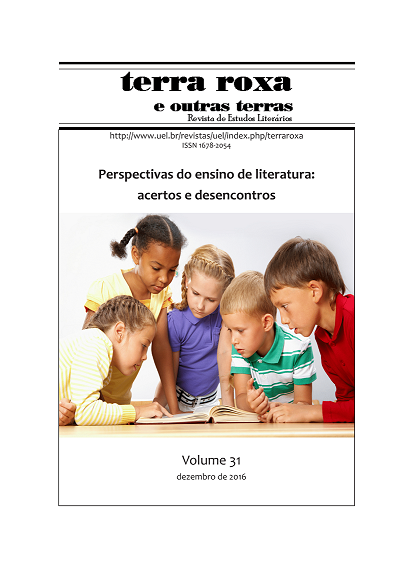Literary reading in middle school: the teacher’s identity in question
DOI:
https://doi.org/10.5433/1678-2054.2016v31p70Keywords:
Literary reading, Middle School, Reader development, Teacher trainingAbstract
This article aims to present some brief reflections on the literary reading in Middle School, considering the in-between place occupied by this schooling stage. On one hand, it is preceded by the common practices of the Elementary School, centered on the imaginary exercise and on the appeal to subjectivity, as well as on more playful activities. On other hand, it is followed by the distant, reflective and critical practices that are expected from young readers in High School. In this case, the subjective appropriation of the text seems to be neglected in the classroom and literary reading gives place to literary teaching. We question the prevalence of linguistic studies in attempts to approach the teacher to the literary text, since the aesthetic experience itself is ignored by theses theoretical approaches. Finally, we comment on some observations drawn from reader’s autobiographies written by a group of teachers from county and state public schools of Rio de Janeiro who are also graduate students of the Professional Master in Letters program at UFRJ. By doing so, we try to understand, based on the subjective process taken place in autobiographical writing, how the reader’s and the literature teacher’s identities are built in Elementary School.Downloads
References
BRASIL. Ministério da Educação. Secretaria de Educação Fundamental. Parâmetros curriculares nacionais: terceiro e quarto ciclos do ensino fundamental: língua portuguesa. Brasília, 1998.
CANDIDO, Antonio. “Discurso de paraninfo”. Textos de intervenção. São Paulo: Duas Cidades: Ed. 34, 2002. p. 310-319.
CEREJA, William Roberto. Ensino de literatura: uma proposta dialógica para o trabalho com a literatura. São Paulo: Atual, 2005.
COLOMER, Teresa. Andar entre livros: a leitura literária na escola. São Paulo: Global, 2007.
COLOMER, Teresa, et al (orgs.). Lecturas adolescentes. Barcelona: GRAÓ, 2009.
DELBRASSINE, Daniel. Decouvrir La “lecture litteraire” avec des romans ecrits pour la jeunesse. Namur: Presses universitaires de Namur, 2007.
DIONÍSIO, Maria de Lourdes da Trindade. A construção escolar de comunidades de leitores: leituras do manual de português. Coimbra: Almedina, 2000.
ECO, Umberto. Ironia intertextual e níveis de leitura. Sobre a literatura. Tradução de Eliana Aguiar. Rio de Janeiro: Record, 2003. p. 199-218.
ISER, Wolfgang. O ato de leitura. Tradução de Johannes Kretschmer. São Paulo: 34, 1996.
JAUSS, Hans Robert. Aesthetic experience and literary hermeneutics. Minneapolis: University of Minnesota Press, 1982.
JOUVE, Vincent. L’effet-personnage dans le roman. Paris: Presses Universitaires de France, 2001.
PETIT, Michèle. A arte de ler ou como resistir à adversidade. Tradução de Arthur Bueno e Camla Boldrini. São Paulo: 34, 2009.
PETIT, Michèle. Leituras: do espaço íntimo ao espaço público. Tradução de Celina Olga de Souza. São Paulo: 34, 2013.
ROUXEL, Annie. “Práticas de leitura: quais rumos para favorecer a expressão do sujeito leitor?”. Cadernos de Pesquisa (São Paulo), v. 42, n. 145, p. 272-283, jan-abr. 2012a. DOI: 10.1590/S0100-15742012000100015.
ROUXEL, Annie. “Mudanças epistemológicas e o ensino da literatura: o advento do sujeito leitor”. Trad. Samira Murad. Revista Criação e Crítica (São Paulo), v. 9, p. 13-24, 2012b. Disponível em: http://www.revistas.usp.br/criacaoecritica/article/view/46858/50609/.
ROUXEL, Annie. “Autobiografia de leitor e identidade literária”. In: Annie Rouxel, Gérard Langlade e Neide Luiza de Resende, (orgs.). Leitura subjetiva e ensino de literatura. São Paulo: Alameda, 2013. p. 67-87.
SOARES, Magda. A escolarização da literatura infantil e juvenil. In: EVANGELISTA, Aracy Alves Martins Evangelista et al, (org.). A escolarização da leitura literária: o jogo do livro infantil e juvenil. Belo Horizonte: Autêntica, 2001. p. 17-48.
TODOROV. Tzvetan. A literatura em perigo. Tradução de Caio Meira. Rio de Janeiro: DIFEL, 2009.
ZILBERMAN, Regina. Formação do leitor na história da leitura. In: Vera Wannmacher Pereira, (org.). Aprendizado da leitura: ciências e literatura no fio da história. Porto Alegre: EDIPUCRS, 2002.
ZILBERMAN, Regina. Da literatura para a vida. In: Juracy Assmann Saraiva & Ernani Mügge. Literatura a escola: propostas para o ensino fundamental. Porto Alegre: Artmed, 2006.
Downloads
Published
How to Cite
Issue
Section
License
Authors who publish in this journal agree to the following terms:
a) The authors retain the copyright and grant the journal the right of first publication, the work being simultaneously licensed under the Creative Commons Attribution-NonCommercial 4.0 International License, allowing the sharing of the work with acknowledgment of the authorship of the work and initial publication in this journal.
b) Authors are authorized to assume additional contracts separately, for non-exclusive distribution of the version of the work published in this journal (eg, publish in an institutional repository or as a book chapter), with acknowledgment of authorship and initial publication in this journal.
c) Authors are allowed and encouraged to publish and distribute their work online (e.g. in institutional repositories or on their personal page) after the editorial process, as this can generate productive changes as well as increase impact and citation of the published work (See The Effect of Open Access).
d) The authors of the approved works authorize the journal to, after publication, transfer their content for reproduction in content indexers, virtual libraries and the like.
e) The authors assume that the texts submitted for publication are of their original creation, taking full responsibility for their content in case of any objection by third parties.



















